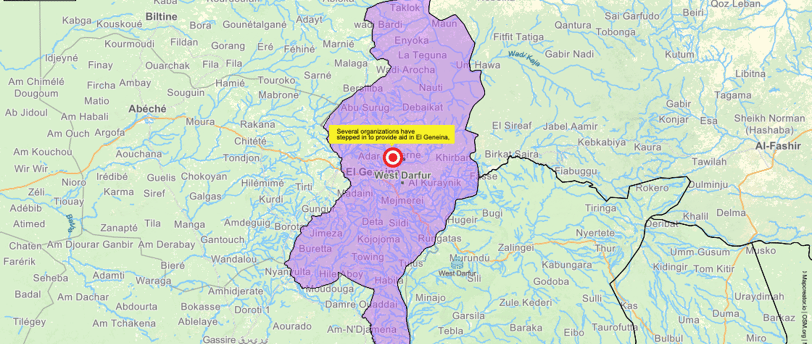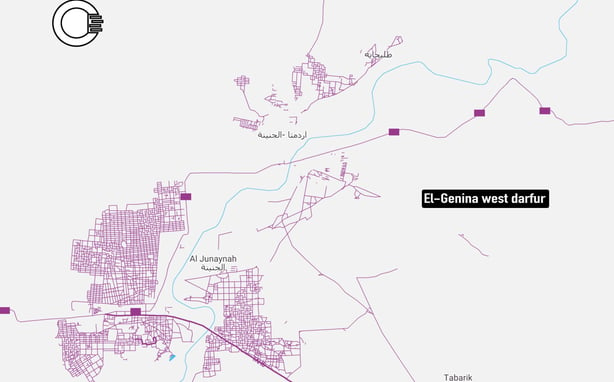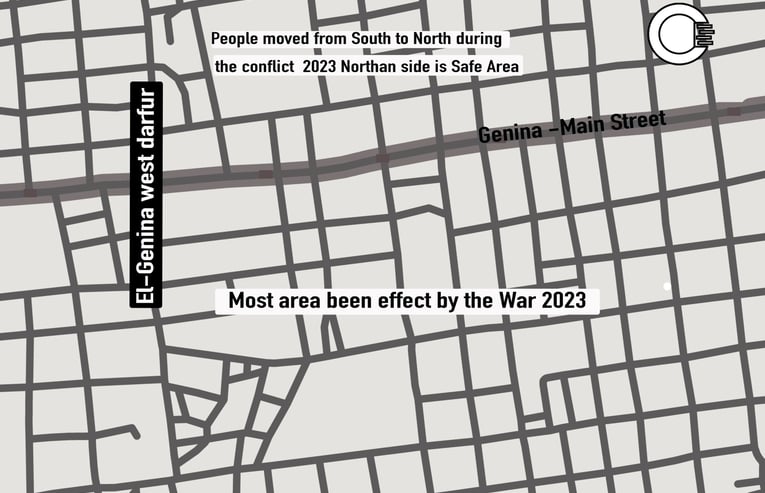Situation Update: El Geneina, July, 2024
People They can buy food, but the prices have increased dramatically.
HUMANITARIAN ACCESS


Situation Update: El Geneina, July, 2024
Current Situation In West Darfur, the war between the Sudanese Armed Forces (SAF) and Rapid Support Forces (RSF) and Arab militias that started in 2023 has taken a massive toll on the region and on the majority ethnic Masalit community. The violence has included serious atrocities and mass displacement. According to the IOM Displacement Tracking Matrix (February 2024), over 171,795 internally displaced persons (IDPs) are scattered throughout the state, while many hundreds of thousands of others have sought refuge across the border in Chad. Chad hosts nearly 1.4 million refugees impacted by the conflict in Sudan, making it one of the five countries with the highest number of refugees in the world.
Over the past year, the RSF and their allied militias have consolidated their control over El Geneina and its surrounding areas with Governor Tijani Al-Taher Karshom controlling the area. This RSF dominance has contributed to the exodus of residents, who continue to flee to Chad where they face harsh living conditions in refugee camps.
The majority of those displaced are Masalit, and many who have sought refuge in camps such as Riyadh Camp, Ardamta Maqtaa Camp, and Dorti Camp in the northeast. However, the camps to the west, south, and east remain uninhabitable, limiting options for displaced people seeking safer havens
The security landscape in El Geneina remains precarious, characterized by intermittent periods of calm punctuated by sudden bursts of violence, while human rights abuses continue.
On Monday, July 22nd, a warplane was observed circling overhead, while anti-tank weapons were discharged from army headquarters which is now under control of the Rapid Support Forces (RSF). No casualties were reported. In another incident, on July 18, the RSF arrested a civilian from his home in the Al Salam neighborhood because he was a soldier in the mixed Sudanese-Chadian forces and accused him of collaborating with military intelligence.
Nevertheless, refugees and displaced individuals have been cautiously returning to El Geneina and settling in the southern neighborhoods of Al-Thawra, Tadamon, and parts of Al-Zuhur, areas largely deserted since the outbreak of war in April 2023. The RSF has refused to establish new camps, instructing them to live in abandoned houses instead. This has created further instability and difficulty for these families, who lack basic amenities and safety.
The returnees face many challenges. One returnee, Ikhlas Ahmed Muhammad, who returned to El Geneina from a refugee camp in Chad, described the exorbitant transportation costs from Abu Tanqi Lardi camp (4 to 5 thousand Sudanese pounds, equivalent to 9 USD) and her inability to afford these as a daily worker. She also mentioned health issues and the challenges of raising her two children, aged 8 and 5, with insufficient aid. Returning to El Geneina allows her to work and provide for her family despite the challenges.
Education
Schools have gradually reopened, starting with Kaja School in February 2024 for the first and second grades of primary school. The currently operational schools include:
- Rabat Middle School
- Imam Al-Kadhim Primary School
- Al Zahraa School (newly opened)
- Al Buhaira Basic School
- Kaja School for primary grades 1 & 2
- Al Nour School in Al Shati neighborhood
- El Geneina Girls Secondary School
- Industrial Garden School
These schools are supervised and supported by the Norwegian Refugee Council (NRC), with the Solidarity Organization handling environmental awareness, distribution of dignity bags to female students, and provision of water to schools.
Health
Despite being looted and out of service in the early weeks of the April 2023 war, the El Geneina Teaching Hospital has remained the only hospital in the city, providing free life-saving medical care to vulnerable populations, addressing the consequences of last year’s mass violence and the continuous increase in humanitarian needs.
It Provides internal medicine, obstetrics, and surgery but struggles with significant funding shortfalls that affect its ability to offer free services. Specialists are available only during the day, limiting access to specialized care, while general doctors trained by Doctors Without Borders handle pediatric care.
The hospital treats common diseases like malaria, colds, diarrhea, and malnutrition in children and pregnant women. Free treatment is provided for general pediatrics and gunshot wound surgeries; other treatments are patient-funded, which means the poor cannot access treatment.
Dispensaries in El Geneina, such as Sultan Medical Complex, maintain stable medication prices despite the conflict but rely on unofficial supplies from Chad.
Children’s admissions range from 100-150 daily, with ward occupancy at 20-30 patients; adult wards see about 20 patients per ward. Overcrowding and refugee displacement further strain resources, with anticipated increases in seasonal diseases like malaria exacerbating these challenges.
Additional support is essential to enhance healthcare delivery, ensure consistent access to medicines, and strengthen the resilience of local health infrastructure. Continued collaboration and increased resources are crucial to providing sustainable stability and hope for the residents and returnees of El Geneina amidst ongoing adversities.
Food
People are heavily reliant on humanitarian aid. They can buy food in the market, but the prices have increased dramatically. The World Food Programme (WFP) has reported a significant increase in the price of basic staples such as sorghum, which has surged by over 150% in the past year. In response to these rising costs, the WFP has committed to providing relief from June to December 2024 through the distribution of aid cards. These aid cards will help families access essential food supplies amidst the soaring prices.【10†source】【11†source】.
Challenges for Life in El Geneina
El Geneina faces severe challenges due to ongoing conflict, and despite the current relative calm, these challenges persist. The clashes between the SAF, RSF, and Arab militias have caused violence and instability, forcing residents to flee to Chad, where they endure harsh conditions in refugee camps. Returning residents encounter destroyed homes, inadequate shelter, and scarce amenities. Healthcare services, supported by organizations like the International Medical Corps (IMC), World Relief (WR), World Food Programme (WFP), and Save the Children, struggle to meet the high demand. Surging food prices have led to heavy reliance on WFP aid. Education is limited, with schools facing resource and security issues. Economic hardship is rampant, with high transportation costs and few job opportunities due to the conflict. Access to clean water remains a significant challenge. The cumulative impact of these issues necessitates continued support from humanitarian organizations to address El Geneina's pressing needs .
Humanitarian Aid Efforts in El Geneina
Several organizations have stepped in to provide aid in El Geneina, supplementing the efforts of the World Food Programme (WFP):
Doctors Without Borders (MSF): Continues to provide essential healthcare services, despite disruptions due to violence .
Première Urgence Internationale: Involved in health and nutrition support for displaced and vulnerable populations .
International Organization for Migration (IOM): Assists with managing displaced populations and providing humanitarian aid .
U.S. Agency for International Development (USAID): Active in delivering aid in the region
Sudanese Red Crescent Society: Also active in delivering aid and support .
The cumulative impact of these efforts by humanitarian organizations is crucial to addressing El Geneina's pressing needs amidst the ongoing crisis .




